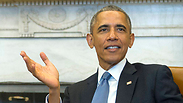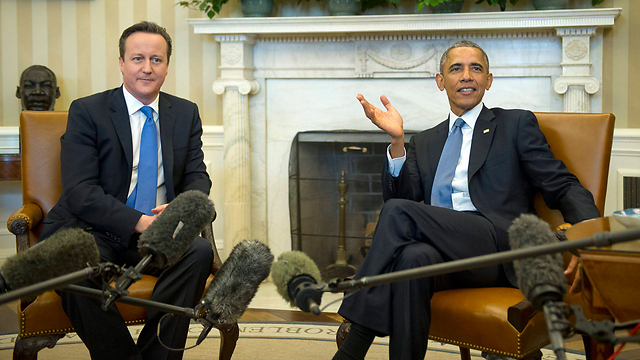
US President Obama
Photo: AP
Europe must do more to better integrate its Muslim communities, and not "simply respond with a hammer," US President Barack Obama said Friday in the wake of last week's terror attacks in France.
"Our biggest advantage, major, is that our Muslim populations – they feel themselves to be Americans," Obama told a joint press conference with British Prime Minister David Cameron.
"There are parts of Europe in which that's not the case. And that's probably the greatest danger that Europe faces... it's important for Europe not to simply respond with a hammer and law enforcement and military approaches to these problems."
Obama and British Prime Minister David Cameron pledged a joint effort Friday to fight domestic terrorism following deadly attacks in France. They also strongly urged the US Congress to hold off on implementing new sanctions on Iran in the midst of nuclear talks.
Cameron's visit to Washington came one week after 17 people were killed in attacks in France, heightening fears in Europe and the United States about the spread of terrorism.
US President Barack Obama (צילום: רויטרס)
"This is a problem that causes great heartache and tragedy and destruction," Obama said in a joint news conference with Cameron. "But it is one that ultimately we are going to defeat."
The prime minister was blistering in his assessment of those responsible for the attacks, calling them part of a "poisonous, fanatical, death cult."
"We know what we're up against, and we know how we will win," Cameron said. He spoke as British police chiefs announced that the Paris attack on a kosher supermarket and anti-Semitic rhetoric from extremists had led them to study ways to increase protection for the Jewish community.
As Obama and Cameron met at the White House, representatives from their countries were joining negotiating partners for another round of nuclear talks with Iran. Both leaders strenuously urged Congress to avoid ordering new economic sanctions on Iran in the midst of those negotiations, arguing that doing so could upend the delicate diplomacy.
"Why is it that we would have to take actions that might jeopardize the possibility of getting a deal over the next 60 or 90 days?" asked Obama, who said he would veto legislation if it reached his desk. "What is it precisely that's going to be accomplished?"
Negotiators have set a March deadline for reaching a framework that would address the international concerns about Iran's nuclear program.
Cameron said he had called some senators Friday to make the case for holding off on new penalties.
The prime minister arrived in Washington with a request for Obama to help persuade US technology companies to give governments more access to encrypted communications that terrorists may use to plot attacks.
Cameron's policy proposals have stoked concern on both sides of the Atlantic about the prospect of security efforts encroaching on privacy, particularly in the wake of the 2013 spying disclosures by former NSA contractor Edward Snowden.
"As technology develops, as the world moves on, we should try to avoid the safe havens that would otherwise be created for terrorists to talk," Cameron said.
Obama didn't take a position on Cameron's proposal, but he did say it was important to be able to keep tabs on terrorists who are using social media and the Internet.
"When we have the ability to track that, in a way that is legal, conforms with due process, rule of law and oversight, then that's a capability we have to preserve," Obama said.
American Internet companies, concerned about keeping the trust of individual and commercial customers around the world, have sharply criticized government eavesdropping programs revealed by Snowden, the former NSA analyst. They have also publicly supported legislation aimed at restricting future surveillance.
AFP and the Associated Press contributed to this report.
















